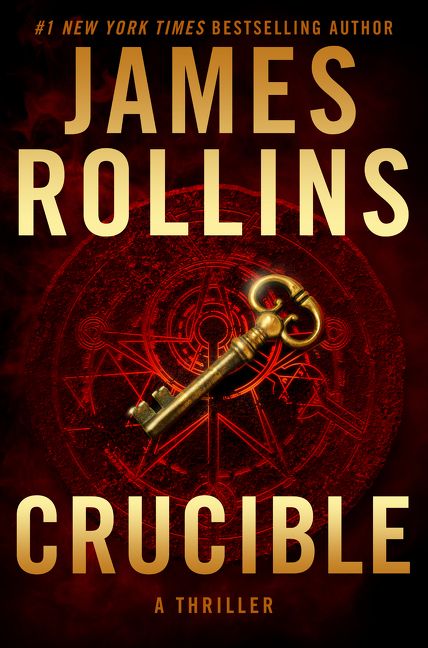 James Rollins was 13 years old when he received a Christmas present he will never forget: a paperback copy of WATERSHIP DOWN by Richard Adams. At first, the rabbit on the cover and the plot description referencing talking animals led him to believe that it was a children’s book he had clearly outgrown. But once he decided to give it a chance, he found himself lost in the story as he discovered “a world as exciting as any war novel, with great battles and terrifying conflicts.” To this day, WATERSHIP DOWN remains not only one of his all-time favorite books, but also one of the most influential. Over the course of his career as a novelist, Rollins has written stories from unique perspectives --- and his upcoming novel, CRUCIBLE, is no exception. This latest Sigma Force thriller, which releases on January 22nd, tackles the growth of a human-like artificial intelligence, from its cold infancy to something nearly incomprehensible.
James Rollins was 13 years old when he received a Christmas present he will never forget: a paperback copy of WATERSHIP DOWN by Richard Adams. At first, the rabbit on the cover and the plot description referencing talking animals led him to believe that it was a children’s book he had clearly outgrown. But once he decided to give it a chance, he found himself lost in the story as he discovered “a world as exciting as any war novel, with great battles and terrifying conflicts.” To this day, WATERSHIP DOWN remains not only one of his all-time favorite books, but also one of the most influential. Over the course of his career as a novelist, Rollins has written stories from unique perspectives --- and his upcoming novel, CRUCIBLE, is no exception. This latest Sigma Force thriller, which releases on January 22nd, tackles the growth of a human-like artificial intelligence, from its cold infancy to something nearly incomprehensible.
In preparing for this blog, I glanced through several of last year’s Christmas entries, and I found myself nodding my head. I could relate to the many tales of finding a treasured tome under the boughs of a Christmas tree. I could also appreciate A. J. Finn’s torture of his younger sister (I have four younger siblings whose therapy bills I am required to pay due to the psychological extremes of my early storytelling). And I certainly wish someone had gifted me with 40 Doc Savage novels, like Nick Petrie related. Unfortunately, I had to cobble together my collection by scouring bookstores, garage sales and used paperback bins. What great parents Nick must have!
So, what did my parents get me for Christmas in St. Louis back in 1974 --- when I was 13 years old, at that awful cusp of teenagerdom? I opened the smallest of presents first, which from the size and bendable nature of the object was clearly a paperback book. Being the avid reader that I was, I excitedly ripped through the wrapping, expecting some military thriller or hard science fiction novel, as was my taste at that time, at that age when young boys set aside tales of wizards for more hard-boiled stories. What did I find staring back at me? The cover of the novel featured a rabbit running past some thorny bushes --- and there was not even a hunter lurking behind that thicket. To make sure, I even flipped to the backside, where I read the description of the novel --- WATERSHIP DOWN by Richard Adams.
I turned to my mom and asked the obvious question: “You bought me a book about talking rabbits?” I’m sure there was some roll of my eyes to accentuate my disdain.
Her answer: “But you like animals, don’t you? I thought you’d love this book.”
 Clearly she did not recognize how I had outgrown fanciful books of frolicking Disney animals. In disgust, I set aside the book for several months. Still, my mom was right. I did like animals, so I eventually found myself venturing into the story. What I discovered within those pages was a world as exciting as any war novel, with great battles and terrifying conflicts. It was also a story that presented a naturalist’s view of rabbits, from their dietary habits to their behavior. I quickly became lost in the story of the little prophetic Fiver, his brother Hazel, and their attempt to lead their warren to safety after their home is threatened by a land developer. It remains not only one of my all-time favorite books, but also one of the most influential.
Clearly she did not recognize how I had outgrown fanciful books of frolicking Disney animals. In disgust, I set aside the book for several months. Still, my mom was right. I did like animals, so I eventually found myself venturing into the story. What I discovered within those pages was a world as exciting as any war novel, with great battles and terrifying conflicts. It was also a story that presented a naturalist’s view of rabbits, from their dietary habits to their behavior. I quickly became lost in the story of the little prophetic Fiver, his brother Hazel, and their attempt to lead their warren to safety after their home is threatened by a land developer. It remains not only one of my all-time favorite books, but also one of the most influential.
To understand why, we have to fast forward six years to when I was seated before the interview committee at the University of Missouri’s veterinary college. I was asked the typical question: What inspired you to want to be a veterinarian? I’m sure other applicants had life-transforming stories or maybe even a few mentioned ALL THINGS GREAT AND SMALL by James Herriot. My answer: the works of Richard Adams, specifically WATERSHIP DOWN.
As you might imagine, from the blank stares of the interviewers, this answer required some elaboration. I had to explain how Adams infused his novel with real biology, husbandry and animal behavior to put readers into those unique paws. Even today, many decades later, I’ll see a hare dashing across a field and be drawn back to that story, knowing there is an entire inner world to that small figure flying through the grass.
So, while I was always a lover of animals and science, it was that one book that stoked a desire in me to become an advocate for all such creatures --- great and small. And it was likely that unique answer that got me into veterinary school.
Of course, I’m sure WATERSHIP DOWN also stoked that other desire already rooted in my soul: to tell unique stories from unexpected perspectives. Over the course of my career as a novelist, I’ve written stories from the point of view of various animals: a military war dog, a young western mountain gorilla, even the deadly castes of a predatory wasp species. In my latest, CRUCIBLE, I tackle the growth of a human-like artificial intelligence, from its cold infancy to something nearly incomprehensible.
So even in this regard, a book about “talking rabbits” continues to propel the direction of my storytelling.
Now, over the years, I’ve mentioned WATERSHIP DOWN --- both during book talks and in print --- and rightfully sang the praises of this novel. I always hoped those words would somehow reach Richard Adams. I’ll never know. He passed away in 2016, on Christmas Eve, which I find both tremendously sad yet poignant, knowing what I found under a Christmas tree so long ago.
A tale of talking rabbits --- along with two careers.


